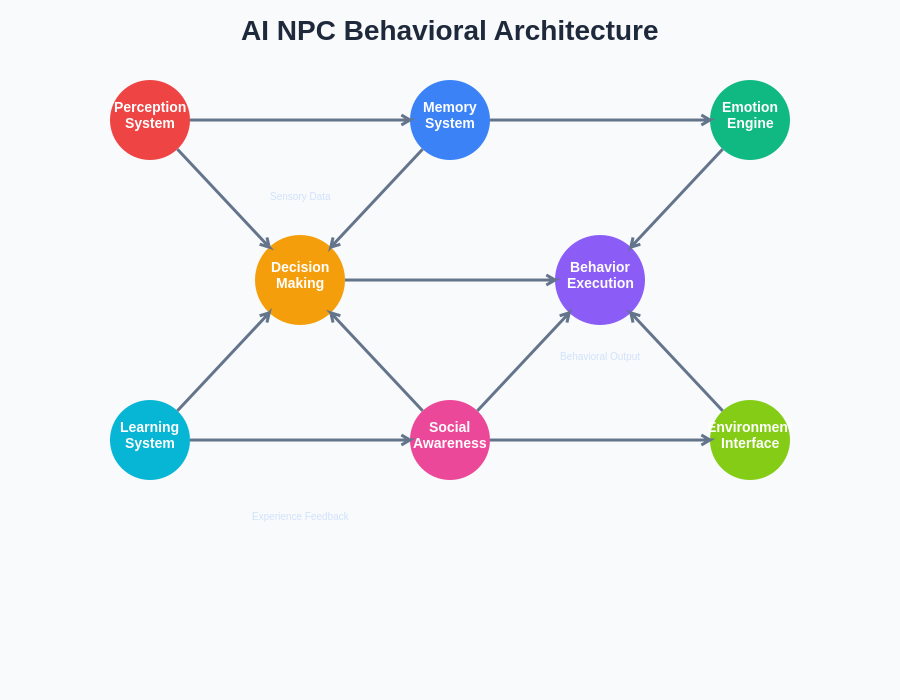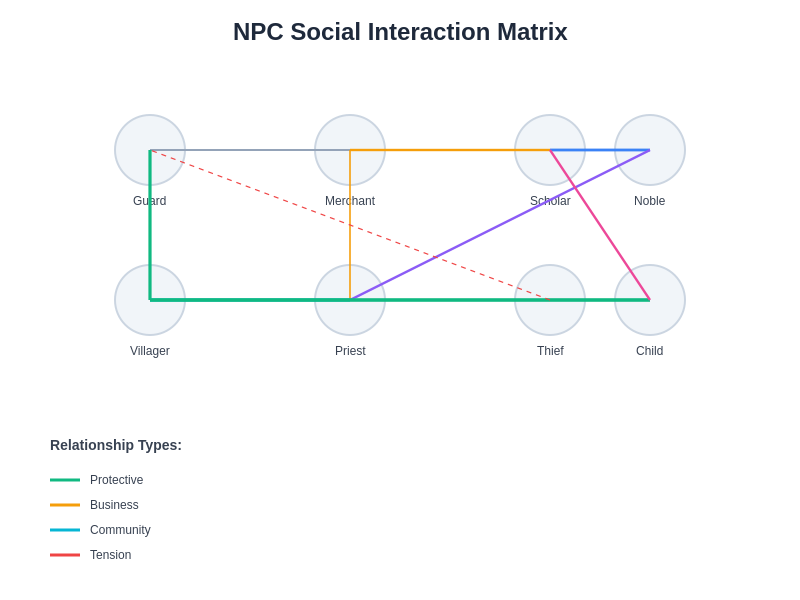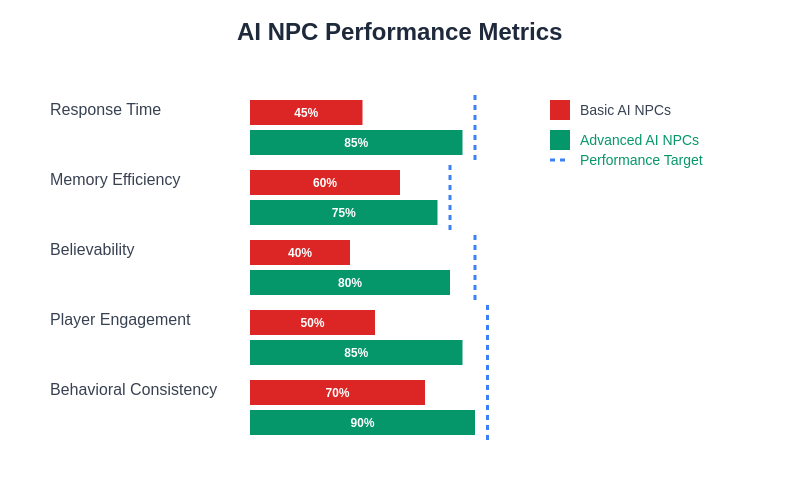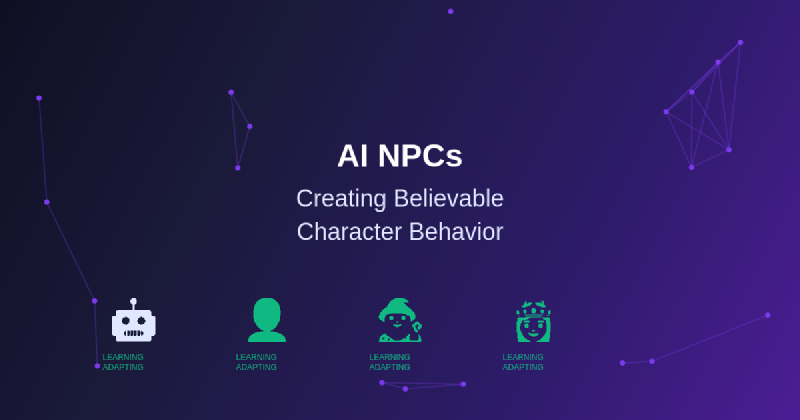The evolution of non-player characters in video games has reached a revolutionary milestone with the integration of advanced artificial intelligence systems that create genuinely believable and engaging character behaviors. Modern AI NPCs transcend the limitations of traditional scripted interactions, offering dynamic responses, emotional depth, and contextual awareness that blur the lines between artificial and authentic character interactions. This transformation represents a fundamental shift in game design philosophy, where NPCs evolve from mere functional elements into compelling digital personalities that enhance player immersion and create memorable gaming experiences.
Discover the latest AI gaming innovations that are pushing the boundaries of what’s possible in interactive entertainment and character development. The integration of sophisticated AI systems into NPC design has opened new frontiers in storytelling, player engagement, and dynamic world-building that continue to redefine the gaming landscape.
The Foundation of Believable AI Behavior
Creating believable NPC behavior requires a deep understanding of human psychology, behavioral patterns, and the subtle nuances that make characters feel authentic and relatable. Modern AI systems leverage machine learning algorithms, natural language processing, and behavioral modeling to create NPCs that exhibit consistent personality traits, emotional responses, and decision-making processes that align with their established character profiles. This foundation ensures that every interaction feels meaningful and contributes to the overall narrative coherence of the gaming experience.
The key to believable AI behavior lies in the balance between predictability and spontaneity, where NPCs maintain consistent core characteristics while demonstrating the capacity for growth, adaptation, and surprising responses to novel situations. This delicate equilibrium creates characters that feel familiar yet unpredictable, establishing emotional connections with players while maintaining the element of discovery that keeps gaming experiences fresh and engaging.
Advanced Behavioral Modeling Techniques
The development of sophisticated behavioral models forms the cornerstone of believable NPC design, incorporating multiple layers of decision-making processes that mirror human cognitive patterns. These systems utilize hierarchical behavior trees, finite state machines, and neural networks to create complex behavioral frameworks that can handle diverse scenarios while maintaining character consistency. The integration of these technologies allows NPCs to process environmental cues, player actions, and contextual information to generate appropriate responses that feel natural and purposeful.
Machine learning algorithms play a crucial role in refining NPC behavior over time, analyzing player interactions and adjusting responses to create more engaging and personalized experiences. This adaptive approach ensures that NPCs evolve and improve their behavioral patterns based on real-world player feedback, creating characters that become more believable and engaging through continued interaction and refinement.
Emotional Intelligence in Digital Characters
The implementation of emotional intelligence systems represents a significant breakthrough in NPC development, enabling characters to recognize, process, and respond to emotional cues from players and other NPCs within the game world. These systems utilize sentiment analysis, facial expression recognition, and behavioral pattern detection to create emotionally aware characters that can adapt their responses based on the emotional context of interactions. This emotional depth transforms NPCs from reactive entities into proactive participants in the gaming narrative.
Experience advanced AI reasoning capabilities with Claude to understand how sophisticated AI systems process complex emotional and contextual information to create more believable character interactions. The development of emotionally intelligent NPCs requires careful consideration of psychological principles, cultural contexts, and individual personality variations that contribute to authentic emotional responses.
Dynamic Dialogue and Conversation Systems
Traditional dialogue trees have given way to dynamic conversation systems powered by natural language processing and generative AI technologies that enable NPCs to engage in fluid, contextual conversations with players. These systems analyze player input, understand intent and emotion, and generate appropriate responses that maintain character voice while advancing narrative objectives. The result is conversational experiences that feel natural and unscripted, allowing for genuine dialogue exploration and character development.
The implementation of advanced dialogue systems requires sophisticated understanding of language patterns, cultural contexts, and character-specific speech characteristics that contribute to authentic voice and personality expression. NPCs equipped with these systems can engage in complex conversations, remember previous interactions, and build relationships with players over time, creating deeper emotional connections and more immersive storytelling experiences.
Contextual Awareness and Environmental Intelligence
Believable NPCs must demonstrate comprehensive awareness of their environment, understanding spatial relationships, object interactions, and contextual relevance of their surroundings. This environmental intelligence enables characters to navigate complex game worlds naturally, interact with objects purposefully, and respond appropriately to changing environmental conditions. The integration of computer vision, spatial reasoning, and object recognition systems creates NPCs that move and behave as naturally within their digital environments as living beings would in the physical world.
Environmental awareness extends beyond mere navigation to encompass understanding of social spaces, appropriate behaviors for different locations, and the ability to recognize and respond to environmental storytelling elements. This comprehensive contextual understanding enables NPCs to contribute to world-building through their natural interactions with the environment and other characters.
Memory Systems and Relationship Building
Advanced memory systems enable NPCs to maintain persistent knowledge of past interactions, player choices, and relationship dynamics that inform future behavior patterns. These systems store and process information about player preferences, past conversations, shared experiences, and emotional moments to create characters that demonstrate genuine relationship progression and personal growth. The implementation of sophisticated memory architectures allows NPCs to reference past events, show character development over time, and maintain consistent relationship dynamics that enhance narrative immersion.
The development of relationship-building systems requires careful consideration of human social dynamics, attachment patterns, and the gradual development of trust and intimacy that characterizes meaningful relationships. NPCs equipped with these capabilities can form lasting connections with players, remember significant moments, and demonstrate loyalty, friendship, or other relationship qualities that enhance emotional engagement with the game world.

The complex architecture underlying believable AI NPCs integrates multiple systems working in harmony to create characters that feel authentic and engaging. This comprehensive approach ensures that every aspect of character behavior contributes to a cohesive and believable personality that enhances player immersion.
Procedural Personality Generation
The creation of unique and diverse NPC personalities through procedural generation techniques enables game developers to populate worlds with characters that feel individually crafted while maintaining development efficiency. These systems utilize personality frameworks, psychological models, and behavioral templates to generate characters with distinct traits, preferences, and behavioral patterns that create a rich tapestry of diverse personalities within game worlds. The procedural approach ensures that players encounter unique characters throughout their gaming experiences while maintaining the depth and consistency required for believable interactions.
Procedural personality generation incorporates elements of psychology, sociology, and cultural anthropology to create characters that feel authentic within their fictional contexts while demonstrating the complexity and nuance of real human personality. This approach enables developers to create vast worlds populated with unique individuals without requiring manual character creation for every NPC encountered.
Enhance your research capabilities with Perplexity to explore the psychological and behavioral research that informs advanced NPC personality development and character design methodologies. The integration of scientific understanding of human behavior into game design creates more authentic and engaging character interactions.
Adaptive Learning and Player Response Systems
Modern AI NPCs incorporate machine learning systems that enable them to adapt and evolve based on player interactions, creating characters that become more sophisticated and personalized over time. These adaptive systems analyze player behavior patterns, preferences, and interaction styles to adjust NPC responses and behavior to create more engaging and tailored experiences. The result is characters that seem to genuinely learn from and grow through their relationships with players, creating a sense of authentic character development and relationship progression.
The implementation of adaptive learning systems requires careful balance between character consistency and growth, ensuring that NPCs maintain their core personality traits while demonstrating realistic adaptation and learning from experiences. This balance creates characters that feel both familiar and dynamic, capable of surprising players while maintaining the fundamental characteristics that define their identity.
Social Dynamics and Group Behavior
Believable NPCs must function not only as individual characters but as members of complex social ecosystems that demonstrate realistic group dynamics, social hierarchies, and community interactions. The development of social AI systems enables NPCs to understand their roles within communities, respond appropriately to social cues, and participate in group activities that enhance world-building and narrative depth. These systems model social psychology principles to create communities that feel authentic and lived-in.
Group behavior systems enable NPCs to coordinate activities, share information, respond to community events, and maintain social relationships with other characters that exist independently of player interaction. This creates game worlds that feel alive and dynamic, where communities continue to function and evolve even when players are not directly observing or interacting with them.

The intricate web of social relationships and interactions between NPCs creates believable communities that enhance world-building and provide rich contexts for player engagement. These social systems demonstrate how individual character behaviors combine to create complex group dynamics.
Technical Implementation Challenges
The development of believable AI NPCs presents significant technical challenges that require innovative solutions in areas such as computational efficiency, real-time processing, and system scalability. Creating characters with sophisticated behavioral models while maintaining acceptable performance across diverse gaming platforms requires careful optimization of AI algorithms, efficient memory management, and intelligent resource allocation. These technical considerations must be balanced with the creative goals of character development to create solutions that are both technically feasible and artistically compelling.
The integration of multiple AI systems within individual NPCs requires sophisticated coordination mechanisms that ensure different behavioral components work together harmoniously without creating conflicts or inconsistencies in character behavior. This technical complexity demands robust testing frameworks and iterative development processes that can identify and resolve potential issues before they impact player experiences.
Quality Assurance and Testing Methodologies
Testing believable AI NPCs requires specialized methodologies that go beyond traditional software testing to encompass behavioral consistency, emotional appropriateness, and narrative coherence across diverse interaction scenarios. Quality assurance teams must evaluate character responses across thousands of potential interaction combinations while ensuring that NPCs maintain personality consistency and contribute positively to overall game experiences. This comprehensive testing approach requires both automated systems and human evaluation to assess the subtle qualities that contribute to believable character behavior.
The development of effective testing frameworks for AI NPCs involves creating scenarios that stress-test behavioral systems, evaluate edge cases, and assess long-term character development patterns. These methodologies must account for the inherent unpredictability of AI systems while ensuring that character behavior remains within acceptable parameters for the intended gaming experience.
Performance Optimization Strategies
Balancing the computational demands of sophisticated AI systems with real-time gaming performance requirements necessitates innovative optimization strategies that maintain character believability while minimizing system resource consumption. These strategies include intelligent behavior scheduling, selective AI activation based on player proximity, and efficient data structures that support complex behavioral modeling without overwhelming system capabilities. The optimization process requires careful analysis of which behavioral elements contribute most significantly to player perception of believability.
Performance optimization extends beyond individual character systems to encompass the coordination of multiple NPCs within shared game environments, requiring sophisticated resource management systems that can dynamically allocate computational resources based on current gameplay requirements and player attention patterns.

The careful balance between AI sophistication and system performance requires continuous monitoring and optimization to ensure that believable character behaviors enhance rather than detract from overall gaming experiences.
Future Developments in NPC AI
The future of AI NPCs promises even more sophisticated behavioral systems incorporating advances in natural language processing, emotional intelligence, and machine learning that will create characters indistinguishable from human players in their complexity and believability. Emerging technologies such as large language models, advanced neural networks, and quantum computing applications hold the potential to revolutionize NPC development by enabling real-time personality simulation, complex reasoning capabilities, and unprecedented levels of character depth and authenticity.
The integration of virtual reality and augmented reality technologies with advanced AI NPCs will create immersive experiences that blur the boundaries between digital and physical interactions, requiring new approaches to character design that account for multi-sensory engagement and spatial presence. These developments will transform gaming from entertainment medium to genuine social interaction platform where AI characters serve as meaningful companions and collaborators.
Ethical Considerations in AI Character Development
The development of increasingly sophisticated AI NPCs raises important ethical questions about the nature of digital relationships, the responsibilities of developers in creating believable characters, and the potential psychological impacts of deep emotional connections with artificial beings. These considerations require careful evaluation of how AI characters are designed, what information they collect and retain about players, and how their behaviors might influence player emotions and relationships in both digital and real-world contexts.
The creation of believable AI characters also raises questions about representation, diversity, and the perpetuation of stereotypes or biases within character design systems. Developers must consider how procedural generation systems, behavioral models, and dialogue systems reflect and potentially reinforce cultural assumptions while striving to create inclusive and representative character populations that respect and celebrate human diversity.
Industry Impact and Market Evolution
The advancement of AI NPC technology is reshaping the gaming industry by raising player expectations for character interaction quality while creating new opportunities for innovative gameplay experiences and narrative structures. Game developers must adapt to these evolving standards while managing the increased development costs and technical complexity associated with sophisticated AI systems. This evolution is driving consolidation around studios with advanced AI capabilities while creating opportunities for specialized AI development companies to serve the broader gaming market.
The impact extends beyond gaming to influence related industries such as virtual assistants, educational software, and social media platforms that can benefit from advances in believable digital character development. These cross-industry applications create larger markets for AI character technology while driving additional innovation and investment in the field.
The continued evolution of AI NPC technology promises to transform not only gaming experiences but our broader understanding of digital interaction and artificial personality, creating new possibilities for education, therapy, entertainment, and social connection that extend far beyond traditional gaming applications. The development of truly believable AI characters represents a significant step toward artificial general intelligence and has implications for how we understand consciousness, personality, and the nature of authentic interaction in an increasingly digital world.
Disclaimer
This article is for informational purposes only and does not constitute professional advice. The views expressed are based on current understanding of AI technologies and their applications in game development. Readers should conduct their own research and consider their specific requirements when implementing AI NPC systems. The effectiveness and appropriateness of AI character technologies may vary depending on specific use cases, target audiences, and implementation approaches. Game developers should consider ethical implications and player welfare when designing AI character systems.
